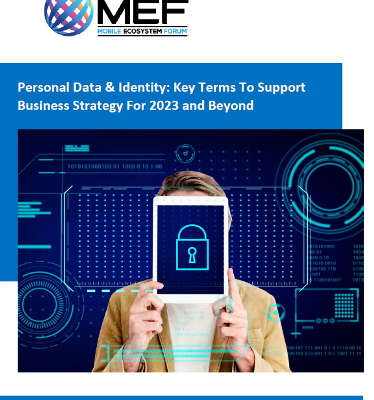The Mobile Ecosystem Forums (MEF) 9th annual Global Trust Report published today (June 21st) has found that consumer trust in data sharing is weak and abstinence levels are increasing.
RELATED: Group-IB discovers 100K+ compromised ChatGPT accounts on dark web marketplaces
The Report found that the vast majority of mobile users have some level of concern about remaining in control of the data they share. Only 12% say they do not worry about this. Yet most are not achieving true control over the data they share with apps and services.
The top three factors that consumers say provide a sense of control all centre around abstaining from sharing information where the user does not feel comfortable.
This isn’t true control, and it presents a challenge for the mobile industry as it makes it difficult to build new data-based technology like AI, recommendation engines, advertising or mobile intelligence.
The Report also found that consumers want more regulation of Big Tech companies, especially around issues of harmful content.
Yet, despite the concerns consumers have about data sharing, there is only muted interest in personal information management systems. The general feeling is that the tech companies should protect their data and privacy, not the consumer should have to take control themselves.
This year, for the fifth year, the Global Trust Report has been supported by Assurant, a leading Fortune 500 global business services company that supports, protects and connects major consumer purchases.
“Nothing is clearer than the words and actions of mobile users. Trust in data sharing is weak. Yet, there are surprising elements in that many users are finding that their perception of an immediate threat is much reduced,” said Dario Betti, CEO of MEF.
Adding: “There is a form of decay in the system that is not easy to view from a distance – data abstinence. The quantity and quality of information that is shared in the system is deteriorating. The study shows that 67% of users globally, avoid sharing their personal data, and only 12% of users say that they do not worry about control of their data.”
The key findings of this year’s report are:
TRUST IN DATA SHARING IS WEAK
The Global Trust Index, a construct based on user perception, currently stands at 54%. This symbolises that trust is weak for almost half of mobile users. The strongest component of the Index is awareness of how personal data may be used, with several indicators suggesting there may be an increasing understanding of risk among mobile users.
INCREASED MOBILE USE IS ACCOMPANIED BY HEIGHTENED DATA SHARING CONCERNS
The perceived value, ease and convenience of services has led to increased usage in many markets; however, data sharing concerns have also heightened. Two thirds of mobile users are concerned about the amount of data collected about them and avoid sharing their information when possible.
USERS STILL LACK KNOWLEDGE OF TOOLS AND SERVICES THAT COULD HELP THEM
Over half of mobile users claim they have been receiving more messages, education and options about how to keep their personal data secure. Yet many users claim they still lack knowledge about tools and services that could help them. Protective data management actions have only slightly increased, with many users uncertain they are much safer for having taken them.
DATA ABSTINENCE IS HOW USERS ASSERT CONTROL
The majority of mobile users have some level of concern for remaining in control of the data they share – only 12% say they do not worry about this. Yet most are not achieving true control over the data they share with apps and services. The top three factors that provide a sense of control all centre around abstaining from sharing information where the user does not feel comfortable.
SOCIAL MEDIA AND BIG TECH ARE DRIVING CONCERNS
Social media companies are the least trusted type of organisation when it comes to looking after personal data, and sharing data on social media is perceived to be the least secure activity. The most common user-selected priorities for regulation are ensuring that big technology companies do not have too much power over personal data.
MUTED INTEREST IN PERSONAL INFORMATION MANAGEMENT SYSTEMS
The majority of users like the idea of controlling who accesses to their data and claim they would check their data frequently. However, there is great inertia – over half state that organisations should look after their data without them needing to be involved in this way, and most also claim they would only use it if it was free. This kind of service will need to expound on a wider range of user benefits in order to appeal to more users.
The Mobile Ecosystem Forums 9th annual Global Trust Report also offers some key lessons for the mobile ecosystem industry:
DON’T BE COMPLACENT
There is a great deal of user concern about sharing personal data, and it should not be forgotten that users would engage more fully in mobile life if their concerns were addressed.
SYSTEMS BUILT ON DATA ARE AT RISK OF UNDERPERFORMING OR FAILING
User reticence to share data poses a risk to any organisation seeking to leverage artificial intelligence or build systems on data such as recommendation engines, advertising or mobile intelligence. All will be less powerful unless users share their data freely and willingly.
USERS STILL NEED TO TAKE MORE ACTIVE CONTROL
Users still tend to manage risk by abstaining from data sharing, with few exercising true ‘control’ over their data. There seems to be an issue of proactive engagement, and a continuing challenge around education which the industry needs to address.
DRAMATISE BENEFITS BEYOND ADDRESSING RISK
Few users currently appreciate the benefits of empowerment solutions such as Personal Information Management Systems, beyond preventing harm, and as a result these tools garner muted interest. There’s an opportunity for the industry to showcase the benefits of enhanced convenience as well as the prevention of harm.
SOCIAL MEDIA GIANTS MUST SHOW CARE FOR USERS, NOT JUST DATA
As social media strengthens its position as the most prevalent and frequent mobile activity, increasing numbers of users feel their security and privacy are exposed. It is incumbent upon social media companies to adopt a leadership role in addressing perceived shortcomings on data transparency and trustworthiness.
The report also goes into detail on:
Experiences of data harm
Data protection actions
Personal information management systems
Regulation priorities for users
Newer developments
Mobile payments
MEF’s 9th annual Global Trust Report will be available for download here:
https://mobileecosystemforum.com/mefs-9th-annual-trust-study/































